
Written by Corrie Pelc — Fact checked by Jill Seladi-Schulman, Ph.D.
Everyone has a favorite position in which they like to sleep. Some people sleep on their sides, which is known as a lateral recumbent position. Some sleep on their stomachs — called prone sleeping — while others sleep on their back, known as supine sleeping.
Now, a new study recently presented at the Alzheimer’s Association International Conference 2024, has found a possible link between supine sleep and neurodegeneration.
The study has not yet been published in a peer-reviewed journal.
This study stems from previous research looking for a link between sleep position and neurodegeneration, including a study published in January 2019 that found sleeping more than two hours a night in a supine position was correlated with an increased risk for neurodegenerative disease.
They studied the participants in-home using the Sleep Profiler developed by California-based neuro-diagnostics device company Advanced Brain Monitoring, which helped calculate how many hours per night they slept in a supine position.
“We developed a technology that profiles neurodegenerative risk by wearing the Sleep Profiler on your forehead to record your sleep for two nights,” Daniel J. Levendowski, president and co-founder of Advanced Brain Monitoring and lead author of this study explained to Medical News Today. “Sleep Profiler assesses nine key indicators (sleep biomarkers) that we’ve found will assist in differentiating the probability of specific neurodegenerative disorders. A Sleep Profiler study can be ordered by a neurologist or sleep medicine specialist.”
“Night Shift is our positional therapy device (that) was designed (to) keep users off of their back in order to treat sleep apnea, i.e. when sleep apnea severity is greater on the back vs. side. Night Shift delivers a vibration, similar to a mobile phone, when back sleeping is detected and it stops the vibration when the user changes sleeping positions,” Levendowski continued.
At the study’s conclusion, Levendowski and his team—which included researchers from the University of California San Francisco, Saint Mary’s General Hospital in Toronto, and Mayo Clinic College of Medicine and Sciences—discovered that participants with the four neurodegenerative conditions tested slept more than two hours in the supine position compared to the control group.
This, the researchers believe, provides further evidence of a strong association between supine sleep and neurodegeneration in Alzheimer’s disease, Parkinson’s spectrum disorder, and mild cognitive impairment.
“Neurotoxins are generated as a result of using our brain during the daytime and are flushed from our brain when we sleep (glymphatic clearance). The accumulation of unflushed neurotoxins in our brain begins around midlife and 15-20 years prior to recognizing the early cognitive symptoms associated with neurodegeneration,” Levendowski explained.
Levendowski said that while their research has established a strong association between supine sleep and neurodegeneration, it has yet to be proven that supine sleep causes neurodegeneration.
“Flushing of neurotoxins is dependent on sleep, so sleep deprivation, insufficient sleep time, and untreated sleep apnea also contribute to long-term risk of neurodegeneration. It is a common belief that back sleeping is superior to side sleeping because the spine is better supported and balanced. However, for brain health, it’s just as easy to comfortably avoid shoulder and neck problems when side-sleeping by using a side-sleeping pillow and/or a mattress topper,” he continued.
MNT also spoke with Daniel Truong, MD, neurologist and medical director of the Truong Neuroscience Institute at MemorialCare Orange Coast Medical Center in Fountain Valley, CA, and editor-in-chief of the Journal of Clinical Parkinsonism and Related Disorders, about this study, who agreed more research in this area is still needed.
“While the association is compelling, this study does not establish causality,” Truong explained. “It remains unclear whether sleeping in a supine position contributes to neurodegeneration or whether people with neurodegenerative conditions are simply more likely to sleep in this position due to factors like reduced mobility.”
“Given the complexity of diseases like Alzheimer’s and Parkinson’s, I would consider how this new information could be integrated with other established treatments or lifestyle recommendations rather than viewing it as a stand-alone intervention,” he continued.
“In practice, this study might encourage discussions with patients about their sleep habits as part of a broader conversation on brain health, especially in patients with such conditions like sleep apnea. It should be viewed as one of many evolving pieces in the puzzle of managing neurodegenerative diseases,” he added.
For readers wondering whether sleep position can impact their risk of developing a neurological condition like Alzheimer’s or Parkinson’s, Truong said it’s important to keep a few factors in mind, including sleep quality and their current lifestyle approach including diet and exercise.
“Some emerging research suggests that sleeping in certain positions — such as on your side — may facilitate the brain’s clearance of waste products, which could theoretically reduce the risk of neurodegenerative diseases.”
— Daniel Truong, MD
“This is linked to the glymphatic system, a brain network that clears toxins more efficiently during sleep. However, while animal studies and small human studies suggest a potential connection, the evidence isn’t strong enough yet to recommend specific sleep positions to prevent these diseases,” Truong explained.
Truong advised readers to consult their doctor as they can help evaluate their sleep habits and provide personalized advice, particularly if they have other risk factors for neurodegenerative diseases.
“In summary, while the idea of sleep position influencing brain health is intriguing, it’s more important to prioritize good sleep hygiene and overall lifestyle factors to reduce the risk of developing neurodegenerative conditions,” he added.
Disclaimer
The information contained in South Florida Reporter is for general information purposes only.
The South Florida Reporter assumes no responsibility for errors or omissions in the contents of the Service.
In no event shall the South Florida Reporter be liable for any special, direct, indirect, consequential, or incidental damages or any damages whatsoever, whether in an action of contract, negligence or other tort, arising out of or in connection with the use of the Service or the contents of the Service. The Company reserves the right to make additions, deletions, or modifications to the contents of the Service at any time without prior notice.
The Company does not warrant that the Service is free of viruses or other harmful components
This article originally appeared here and was republished with permission.












